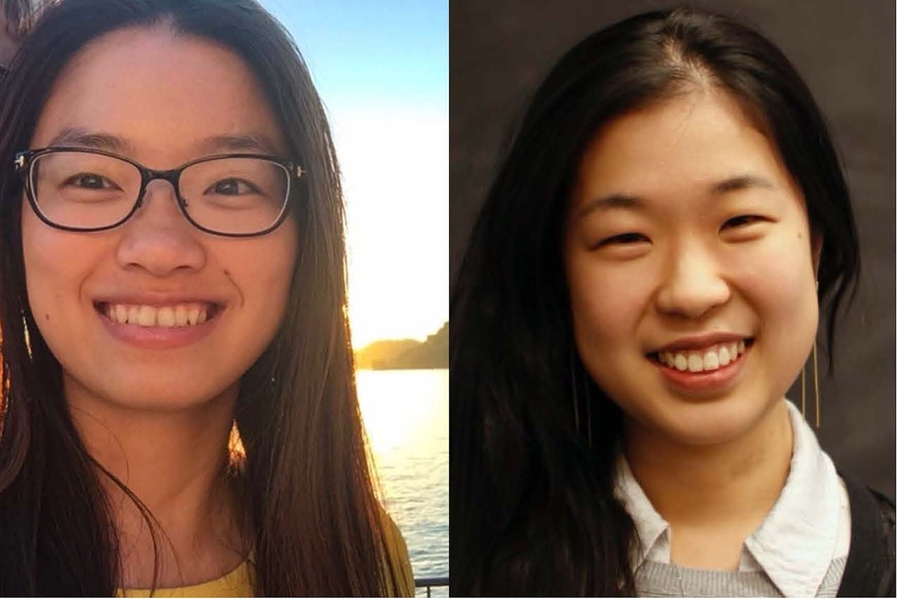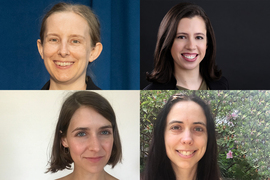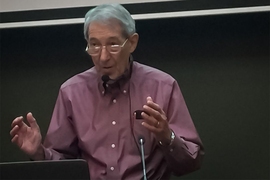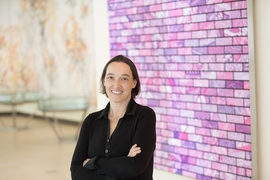An MIT instructor and an alumna have been named winners of the 2022 Maryam Mirzakhani New Frontiers Prize, which recognizes female mathematicians for early-career achievements.
Mathematicians Yilin Wang and Hong Wang PhD ’19 will each receive one of the $50,000 awards, which are given by the Breakthrough Prize Foundation. The prize was created in 2019 in honor of Iranian mathematician and Fields Medalist Maryam Mirzakhani, who was 40 when she died in 2017 from breast cancer.
"Once again, it is uplifting to see women in mathematics receiving a major prize for their outstanding research,” says Michel Goemans, the RSA Professor of Mathematics and head of the Department of Mathematics. “We are proud of Yilin's achievements in probability and Hong’s contributions to Fourier analysis."
Yilin Wang, a CLE Moore Instructor at MIT, will receive the Maryam Mirzakhani New Frontiers Prize “for innovative and far-reaching work on the Loewner energy of planar curves,” according to the award citation.
A mathematician working on probability theory, complex analysis, and related problems in mathematical physics, she focuses on connections among random conformal geometry, geometric function theory, and Teichmueller theory.
Using ideas from the probabilistic theory of random curves called Schramm-Loewner evolutions (SLEs), she introduced the Loewner energy to measure the roundness of a planar loop. She found that it is the same quantity as the universal Liouville action, which is of importance in geometric function theory and Kahler geometry of the infinite-dimensional Teichmueller space, and also has links to string theory. Her works revealed surprising new connections between random conformal geometry and Teichmueller theory, which seemed far apart, and her insights from probability theory have already enabled many new results for the latter.
She also explores the link between the Loewner energy and Gaussian free field, determinants of Laplacians on Riemann surfaces, the Brownian loop measure, and minimal surfaces in hyperbolic 3-space.
Growing up in Shanghai, she moved to France at 18 for classes préparatoires in Lycée du Parc, Lyon, before entering Ecole Normale Supérieure de Paris and receiving master's degrees from University Paris XI (now Paris Saclay) and Paris VI (now Sorbonne University).
Pursuing her doctorate at ETH Zurich under advisor Wendelin Werner, she studied probability theory, specifically the random planar curves called SLEs that appear in statistical mechanics models and modern probabilistic theory of Liouville quantum gravity. She received the NCCR SwissMAP innovator prize and the ETH medal.
Yilin Wang joined MIT as a CLE Moore Instructor in 2019, and is a co-organizer of the MIT Probability seminar. This spring, she also will be a Strauch Postdoctoral Fellow at the Mathematical Sciences Research Institute in Berkeley, California.
Hong Wang PhD ’19 is an assistant professor of mathematics at the University of California at Los Angeles and earned a doctorate in mathematics from MIT in 2019. She received her prize “for advances on the restriction conjecture, the local smoothing conjecture, and related problems,” according to the citation.
Her research is focused on the restriction theory in Fourier analysis. In the 1960s, Stein posed the restriction problem about functions with Fourier support on some smooth compact hypersurface. The restriction problem has been a central open problem in Fourier analysis. The tools created in understanding this problem have also found applications in PDE, number theory, and geometric measure theory.
A native of Guilin, China, Hong Wang studied mathematics at Peking University and completed her diplôme d'ingénieur degree at Ecole Polytechnique in 2014. After receiving her PhD from MIT, she concluded a postdoc at the Institute for Advanced Study in June before joining UCLA.
In her doctoral thesis, she provided an improved estimate for the restriction problem in three-dimensional space based on the work of her advisor, Larry Guth, the Claude Shannon Professor of Mathematics at MIT.
In joint work with Guth and Ruixiang Zhang, she proved Sogge's local smoothing conjecture for the wave equation in dimension 2+1. In another joint work with Guth, Alex Iosevich, and Yumeng Ou, she also researched the Falconer distance set problem, which is about measuring the set of distances between pairs of points in a fractal set.
A third recipient of the prize is Sarah Peluse of the Institute for Advanced Study and Princeton University, who was recognized “for contributions to arithmetic combinatorics and analytic number theory, particularly with regards to polynomial patterns in dense sets.”
This prize is one of several awards given out each year by the Breakthrough Prize Foundation and its founding sponsors Sergey Brin, Priscilla Chan, and Mark Zuckerberg, Ma Huateng, Yuri and Julia Milner, and Anne Wojcicki. A committee of past awardees in each field choose the winners. Traditionally celebrated during a televised awards ceremony, this year’s program is postponed until 2022 due to the pandemic.










